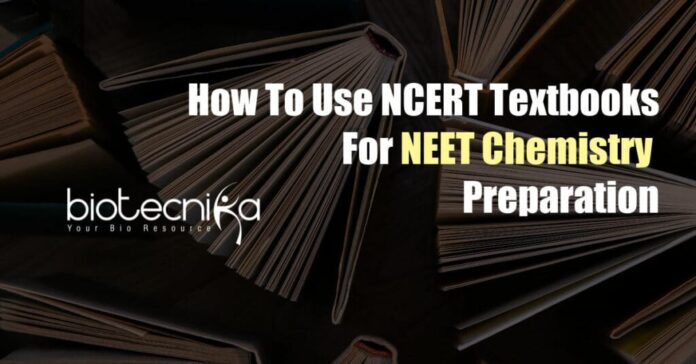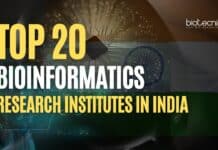NCERT Textbooks For NEET Chemistry
How To Use NCERT Books For Guaranteed Success in NEET
National Eligibility-cum-Entrance Test (NEET) conducted by the National Testing Agency (NTA) is the gateway for medical aspirants seeking admission to undergraduate medical education in medical institutions. Medical aspirants for NEET have to prepare mainly 3 subjects; biology, physics, and chemistry. Most of the medical aspirants prepare for the biology and physics portion easily but ignore the chemistry section. This is because they find chemistry a challenging subject. The major reason for finding the chemistry subject difficult is that students don’t approach it the right way. So, if you are struggling with your NEET Chemistry preparation, seeking answers for questions like “Which is the best book for NEET-Chemistry” and “How to utilize it for strategic success in NEET”, “How to use NCERT Textbooks For NEET Chemistry preparation”, then don’t worry because Biotecnika is here to help you out.
The foremost thing that every NEET aspirant needs to know is the importance of the chemistry section for NEET. The NEET chemistry section comprises a total of 45 questions for an overall of 180 marks. This means, if you are not preparing for this section, it will cost your marks. Therefore, it is very important to prepare for the chemistry section well and when it comes to preparation for NEET Chemistry, choosing the right study material is most important from an exam point of view. For good NEET exam preparation, having the right book is very important as it makes your journey for exam preparation easier, and helps you understand concepts better. NCERT is the best and most important book suggested by experts for NEET exam preparation. Yes “NCERT” you heard it right! NCERT has been considered as the most important book for various competitive exams like NEET. It is considered as a“Holy Book” for NEET aspirants.
So, let’s first find out “Why one should refer to NCERT Textbooks for NEET Chemistry preparation”?
Most of us have read the textbooks published by NCERT in our schools as these are the main school curriculum textbooks prescribed by the Central Board of Secondary Education (CBSE) from class I to XII. Even when it comes to preparation for competitive exams like NEET, NCERT is the highly recommended book suggested by experts and toppers because of the following reasons:
- NCERT books are Accurate: These books are written by experts of their respective fields after intense research. All the facts, information, figures compiled in the book are correct and can never misguide you. They are designed in such a way to provide appropriate and accurate information to the students.
- Easy to understand language: NCERT books are written in very simple language. These books have proper definitions for all concepts, problems with solutions, practice questions to strengthen the concepts and enhance knowledge.
- Provide a Solid foundation to your Basics: NCERT books not only cover the academic syllabus but also provide a strong foundation in clearing your basics. These books are best for clearing out the concepts.
- Questions are directly asked from NCERT: For the NEET exam, NCERT books are used by NEET authorities for designing the exam; there are many questions that are either directly picked from NCERT textbooks. Even the data values are not changed, they are picked as they are. It’s just like you have a chemistry test in school, and your teacher gives you 10 questions to learn for the test, so it’s obvious you will focus on those 10 questions only. You will not even try to study other questions at all. Similarly, if you already know the book from where the questions are picked or framed in the exam, don’t focus on that book. In the case of NEET, it’s NCERT. So next time when you are reading NCERT, read each and every line, page, or chapter from NCERT carefully as maybe the line that you are reading could be the potential question in the exam.
Now, just having NCERT is not enough, how one can strategically utilize NCERT to ace NEET is important. The NEET Chemistry section comprises questions from Organic, Inorganic, and Physical chemistry, and to master all of them, one requires a separate approach. Let’s assume you want to bake a cake, do you think just having the right ingredients will be enough? No, right! The taste and flavor of the cake will depend on the quantity of each ingredient added, the sequence in which they are added, the temperature at which the cake is baked, etc. Similarly, knowing the best book is not enough, one needs to know “What to study” from NCERT and most importantly “How to prepare all 3 sections of Chemistry from NCERT”.
Here are some points that will help you strategically utilize NCERT to the fullest to master all 3 sections of chemistry. It will help you understand How to use NCERT Textbooks For NEET Chemistry Preparation.
Physical Chemistry
It is the branch of chemistry mainly concerned with the physics theories to study chemical systems and the application of the techniques.
- Read every line thoroughly: Read NCERT chapters like you know nothing about it. Every page of the Physical chemistry chapter from NCERT must be read at least 2times.
- Start from basics: Start from the first chapter of NCERT (class XI) “Some basic concepts of chemistry”, first understand basics like what Atomic and molecular masses are, Mole concept, molar mass; percentage composition, empirical and molecular formula, stoichiometry, the structure of atoms and then move on to the next chapter.
- Formula notebook: Maintain a book exclusively for formulas. Note all the formulas from NCERT in a separate sheet/notebook. You can paste the sheets in your room walls so that you can revise them whenever you see them. Revise formulas every day, they should be at your fingertips.
- Understand applications of formulas: Noting formulae and learning them is not enough. One needs to know how to apply them, so for that go through each example given in NCERT.
- Read, understand & then solve NCERT problems: Just read problems given in NCERT, go through their solutions, don’t start solving straight away. Find out which concept from NCERT they are based on. Don’t hurry to solve the numerical problem. Understand the theory behind it. Once you do that, then start solving.
- Focus more on important chapters: Mole concept, Electrochemistry, Ionic & chemical equilibrium, Thermodynamics (work done, Entropy) are some of the important chapters based on their weightage in the exam that one needs to focus on while preparation.
Organic Chemistry
It is the study of the structure, composition, properties, preparation as well as the reaction of organic compounds that are carbon-containing compounds. To learn organic chemistry, you need to adopt a different approach which is mentioned below:
- Write & learn organic reactions: Reactions are given in text form in books, but our mind stores them in the form of a diagram. Therefore, simply reading organic reactions won’t help as you will not be able to retain any organic reaction for a long time. When you are studying organic chemistry, you have to first read, then write and learn the reactions. This you have to do every time when you are learning any organic reaction, if you study like this way, you’ll be able to retain the reactions for a long period of time.
- Practice daily 5-6 mechanism & organic reactions: Make a habit of writing daily 5-6 organic reactions from NCERT every day, explain the mechanism and reaction to yourself to clarify concepts and to retain concepts for a long period of time.
- Highlight & learn NCERT name reactions: About 80% of organic reactions are based on name reactions, you must learn them thoroughly. You must remember the mechanisms of all the named reactions in the NCERT.
- Practice, practice & practice: Solve questions given at the end of every chapter or from previous year question papers to generate interest in organic chemistry.
- Focus more on important topics: Basic principles of organic chemistry, Bohr model for the hydrogen atom, Hybridization, Ideal solutions, Alcohols, Phenols, and Ethers are some of the important topics.
Inorganic Chemistry
It is the study of the behavior as well as properties of compounds. All the elements of the periodic table except hydrogen and carbon, are in the lists of inorganic compounds. To prepare for inorganic chemistry from NCERT, here are some points that one needs to follow:
- Start from basics: Inorganic chemistry demands conceptual clarity, so it is better to start from the very first basic chapter and follow the sequence of chapters.
- Highlight and Underline Text: Make sure to use different markers/pens to highlight important text, for example, you can use 3 colored pens, like yellow for “Fact”, blue for “Concept” and green for “Application”.
- Follow NCERT sequence: Do not try to jump to your favorite topic. NCERT chapters are listed in sequence, starting from basic to details. Chapters are linked. If you skip a chapter, there is a chance you might not be able to understand the next chapter. Study first s block, then p, then d and f block elements.
- Chant the periodic table: Electronic configurations, group numbers, and periodic numbers in your head at any given time of any given day. Paste the periodic table somewhere in your room where you can look at it daily and can revise it.
- Make short notes: Note down all the important points separately in a notebook. You can make notes in the form of a flowchart, table, or diagram which can help you to revise inorganic in minimum time with maximum output.
- Focus on important topics: Chemical bonding, Hydrogen, s block, p block, d and f block, metallurgy, coordination compounds are some important topics you need to focus on while studying.
- Emphasize on Technologically Important Elements: Emphasize elements like iron, titanium, copper, and nickel which are used both structurally and electrically. Don’t forget to prepare transitional metals also as they are used to form several useful alloys, with each other and with other metallic elements.
To Read NCERT Book Effectively- Key Points:
- Refer to Recent Edition NCERT books: Make sure you refer to recent editions of NCERT books. A simple addition or modification of 40 lines in NCERT text means potential 40 questions.
- “epathshala App”: The “epathshala App” of NCERT is developed by the Central Institute of Education Technology (CIET) as well as NCERT and launched in November 2015. It offers educational resources like NCERT textbooks for 1-12th class, supplements, audio-visual resources, and a variety of print and non-print materials. These educational resources are not only for teachers but for students, parents, educators, researchers. It can be accessed on the Web and available on the App Store, Google play as well as Windows.
- QR code: There is a coded box placed on the top corner of every chapter called “Quick Response (QR) code”. You can access e-resources like videos, audios, texts, multimedia etc. related to the theme given in the chapter. There are many QR codes. If you want to access a complete e-textbook, then use the first QR code. Subsequent QR codes are given to help access the relevant e-resources linked to each chapter.
Given below are the sequence of steps to use QR code:
o First, Install the QR code Scanner app from Play Store and open it.
o Second, Get ready with QR code scanning window
o Third, now place the scanner above the QR code
o Fourth, select and click on link
o Use available e-Resource
You can also access the e-resources using epathshala on a desktop/laptop. Click on the link http://epathshala.ncert.org.in/topics.php, then enter the alphanumeric code given under the QR code. You can even download the DIKSHA app from the Google play store and access e-Resources through your smartphone or tablet using DIKSHA or click on given link https://diksha.gov.in/ncert/get and enter the alphanumeric code given under QR code.
- Go slow: It is an age-old saying “Slow and Steady Wins the race”. Although it might appear you have completed just a page, in terms of concept it will be a lot of understanding.
- Do not skip any NCERT question: Each question given in NCERT is one of its kind, so don’t skip any question or you might miss an important concept.
- Read every line carefully: NCERT class 11th and 12th chemistry textbook, each line needs to be read carefully with the utmost attention as each line could be a potential question in NEET.
- Don’t skip the Summary: The questions can come from the summary as well. Read and learn all the summary points given at the back of every chapter.
How to Study from NCERT: To be through with NCERT, requires several rounds of reading. Remember, It’s a Step-By-Step process.
- 1st round: Read NCERT, highlight important points, then go through questions given in the NCERT book
- 2nd round: Read NCERT again, Make Short notes, Solve the previous year’s question paper.
- 3rd round: Read NCERT+NOTES, Use Keywords + Tricks to memorize the concept, Practice more Questions
- 4th Round: Only Practice, Practice, Practice
Remember there is “no shortcut to success”. Preparing for NEET chemistry with the right book and the right strategy will surely help you to score good marks. So, this is the right time that you leave all your fears and doubts about the chemistry section and start preparing for it from NCERT.
Happy Studying!
Keywords: NCERT Textbooks For NEET Chemistry, How to Refer NCERT Books For NEET Chemistry Preparation
Author: Tanushree Saxena





































